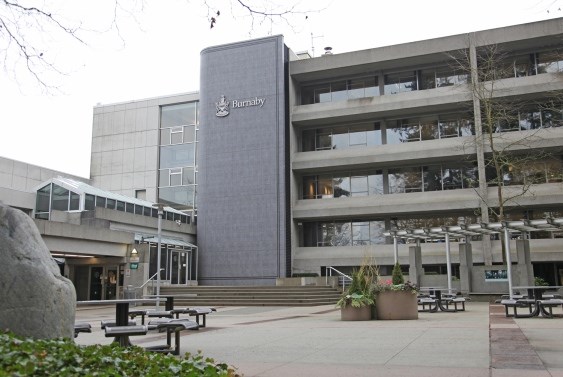When it comes to the Metrotown SkyTrain expansion, Burnaby council can agree on most of TransLink’s plans – except public washrooms.
On Monday, council authorized city staff to prepare a rezoning bylaw to permit the expansion, which is designed to “accommodate ridership demands over the next 30 years.” A report from TransLink noted provisions for bicycle storage, elevators and at-grade retail units, but the most contentious provision was about giving the public a place to, um, go.
Coun. Nick Volkow said he was happy to see public washrooms included in the provisions, but disliked the transit authority’s condition that a third party agree to take on the operation and maintenance of the facilities.
“I’ve been around long enough to know that when we started hearing things about finding agreements in regards with third parties, that sometimes means that we’re never going to find a third party that’s going to agree to deal with us on this,” he said.
Coun. Sav Dhaliwal echoed Volkow’s comments, saying public washrooms should be necessary along major transit routes.
“It is part of the system – if you want to get people to start travelling, make it comfortable,” he said. “When we are adding more and more networks of transportation…(people) should have no difficulty in trying to find a place where they can relieve themselves.”
Dhaliwal referenced the plan by the mayors’ council on regional transportation to inject $7.5 billion into Lower Mainland transit projects, which, if successful, would boost TransLink’s annual budget to $2.2 billion. He said even if they couldn’t find a third party, TransLink should be able to run the washrooms on its own.
“Here’s a supposedly to become a $2.2-billion a year operation and how they can’t find a way to provide public washrooms, it’s just in my opinion, unheard of.”
Likewise, Coun. Pietro Calendino supported implementing washrooms, but suggested putting them only at major stops like Commercial-Broadway and Surrey Central along the Expo Line.
“Perhaps TransLink cannot afford to do washrooms at every single station, but this is going to be the second busiest SkyTrain station in the system,” said Calendino. “They don’t have to provide it at every station, but if it is every five or 10 minutes, I think seniors like me and others will be patient.”
Calendino added that, given fare increases year after year, the transit authority should be able to afford running the washrooms without outside help.
“I think this is part of doing business – they shouldn’t be looking at other partners to take care of cleaning the washroom facilities.”
But Mayor Derek Corrigan said operating public washrooms in a transit system is not only expensive, but “extremely problematic.”
“At many of these locations, they become centres for drug deals, they can be places that are fraught with criminal activity,” he said. “It means you have to really up your level of supervision, which means more staff.
“While I understand that people can have emergencies while they’re out on the SkyTrain, I also think it’s important that people plan their trips and try to avoid having to utilize public washrooms if at all possible.”
But Volkow countered Corrigan’s points, noting that if operators of other public transportation modes pitched running routes in the city, public washrooms would be mandatory.
“If we had (Canadian Pacific Railway) or (Canadian National Railway) back in the day come to the City of Burnaby, or the old Greyhound bus stations, and they wanted to open up a facility, I think our requirement would be that there would be public washrooms,” he said. “So here we are in the 21st century, and we’re coming up with every excuse possible not to do it.”
While also a critic of the heavily delayed $194-million Compass system, Volkow said the fare evasion strategy, if successful, should allow Transit Police more time to deal with more unsavoury characters than turnstile jumpers.
“When that Compass system comes in, there’s going to be a lot less need for people checking for fare evasion, and I think we’ve got a lot of armed police – the highest paid policing department in the province – I think there’s going to be an opportunity for them to do all kinds of policing that might not have been in their mandate when they were created,” he said.
The Metrotown SkyTrain expansion bylaw will go before council for first reading on July 7, with a public hearing scheduled for July 22.



